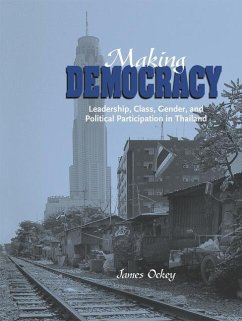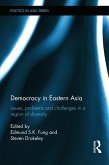Democracy in Thailand is the result of a complex interplay of traditional and foreign attitudes. Although democratic institutions have been imported, participation in politics is deeply rooted in Thai village society. A contrasting strand of authoritarianism is present not only in the traditional culture of the royal court but also in the centralized bureaucracies and powerful armed services borrowed from the West. Both attitudes have helped to shape Thai democracy's specific character. This topical volume explores the importance of culture and the roles played by leadership, class, and gender in the making of Thai democracy. James Ockey describes changing patterns of leadership at all levels of society, from the cabinet to the urban middle class to the countryside, and suggests that such changes are appropriate to democratic government--despite the continuing manipulation of authoritarian patterns. He examines the institutions of democratic government, especially the political parties that link voters to the parliament. Political factions and the provincial notables that lead them are given careful attention. The failure to fully integrate the lower classes into the democratic system, Ockey argues, has been the underlying cause of many of the flaws of Thai democracy. Female political leadership, another imported notion, is better represented in urban rather than rural areas. Yet gender relations in villages were more equitable than at court, Ockey suggests, and these attitudes have persisted to this day. Successful women politicians from a variety of backgrounds have begun to overcome stereotypes associated with female leadership although barriers remain. With its wide-ranging analysisof Thai politics over the last three decades, Making Democracy is an important resource for both students and specialists.
Hinweis: Dieser Artikel kann nur an eine deutsche Lieferadresse ausgeliefert werden.
Hinweis: Dieser Artikel kann nur an eine deutsche Lieferadresse ausgeliefert werden.








